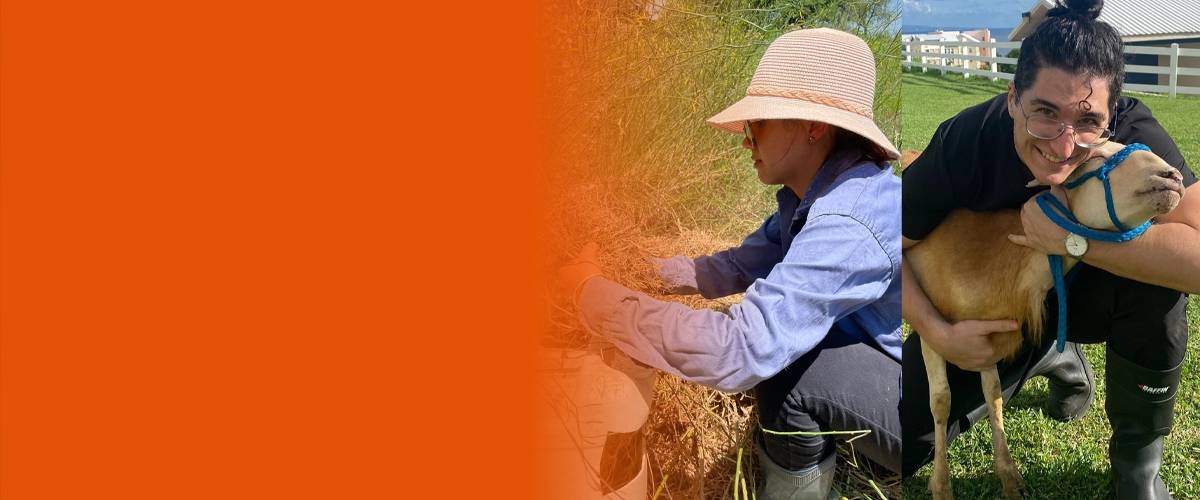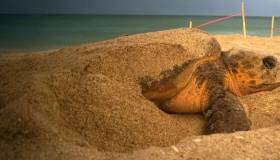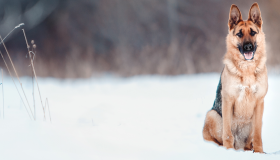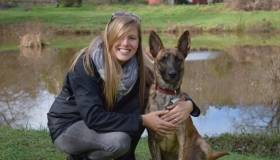
DENVER/Dec. 19, 2023 – Morris Animal Foundation recently announced that 24 students were accepted into its prestigious Veterinary Student Scholar program. This program offers veterinary students an invaluable opportunity to engage in mentor-guided research, fostering their passion for animal health science and inspiring fulfilling careers.
“Our Veterinary Student Scholar program stands as one of the most impactful investments for advancing animal health research,” said Dr. Kathy Tietje, Chief Program Officer at Morris Animal Foundation. “We are thrilled to support students from veterinary schools around the world at this pivotal stage in their careers."
The program provides veterinary students in good standing at accredited veterinary medicine programs with a stipend of up to $5,500 to pursue a research project under the guidance of a mentor.
“Research is the gateway to understanding and innovation,” said student scholar Dennis Ronzani. “The Morris Animal Foundation Veterinary Student Scholar program allows young minds, like myself, to learn and practice the methods that make proficient research.”
Since the program's inception in 2005, about 600 veterinary students have participated, gaining invaluable hands-on research experience. Many have published their findings in peer-reviewed journals as part of larger research projects. Some have transitioned into established investigators, continuing the mentoring cycle to educate future researchers. Past programs have funded students in Australia, Indonesia, Rwanda, Mexico, Brazil, Uruguay, Kenya and the United States.
The students selected for the program, and their respective projects include:
- Annalise Cavender, Midwestern University College of Veterinary Medicine: This project aims to accurately diagnose Valley Fever, or coccidioidomycosis, using a focused assessment with sonography in trauma point-of-care ultrasound.
- Boaz Pkemoi, The University of Nairobi Kenya, Kenya: This project focuses on detecting parasites in Eastern black rhinos and correlating their presence with post-translocation morbidity.
- Jack Friend, School of Veterinary Medicine, University College Dublin, Ireland: This project aims to determine therapeutic targets for metastatic canine mammary tumors using a network pharmacology approach to analyze proteomic data.
- Estefania Benavides, University of Pennsylvania, School of Veterinary Medicine: This project will focus on determining neurodegenerative and neuroinflammatory biomarkers in canine meningoencephalitides of unknown origin.
- Savell Robinson, Cummings School of Veterinary Medicine at Tufts University: This project will examine how heartworm diseases survive without damaging immune and hemostatic responses.
- Courtney Hegwer, Long Island University College of Veterinary Medicine: This project will look at canine anxiety and fear-based behaviors, management and their association with fecal cortisol concentration as a measure of acute stress.
- Caro Wilson, University of Minnesota College of Veterinary Medicine: This project will identify alleles, genes and biological pathways that underlie recurrent exertional rhabdomyolysis pathogenesis in standard and thoroughbred racehorses.
- Bipin Basyal, Tribhuvan University Nepal, Nepal: This project will focus on identifying the status of E. coli and assess the patterns of antibiotic resistivity of involved pathogens isolated from the feces of healthy dogs in the Rupandehi district.
- Dennis Ronzani, Ross University of Veterinary Medicine, Saint Kitts and Nevis: This project will use Morris Animal Foundation’s Golden Retriever Lifetime Study to correlate physical exercise and neoplasia in golden retrievers.
- Yeonsoo Choi, University of Bristol, United Kingdom: This project investigates the correlation between glomerular Eps homology domain protein 3 expression, loss of glomerular endothelial cell fenestrations and chronic kidney disease in cats.
- Madilyn Kriskovich, Oregon State University: This project will examine simplified castration using an Equitwister instrument on a feral horse herd.
- BASHUNGA NIYOMUKIZA Laurence, University of Rwanda, Rwanda: This project aims to assess the current status of wildlife diseases affecting species in Akagera National Park, namely buffalos, lions and rhinoceroses.
- Laurie Boucher, University of Montreal, Canada: This project will study biomarkers indicators of intestinal health in the equine microbiota.
- Camila Felisa Chacón, National University of Littoral, Argentina: This project aims to identify and determine new sensitive biomarkers to pesticide exposure to assess the risk of damage to exposed wild species before irreversible health imbalances occur.
- Christina Kandane Arachige Don, Utrecht University, Netherlands: This project will evaluate the genetics behind overbite, or malocclusion, in huskies.
- Marianne Caudron, University of Montreal, Canada: This project will focus on the association between behavioral factors and recurrence rate in cats with feline idiopathic cystitis.
- Zack English, Colorado State University Veterinary Teaching Hospital: This project evaluates the spatial relationship between the aorta and mitral valve in canine degenerative mitral valve disease.
- Shelly Lownds, St. George’s University, West Indies: This project will screen a frog species for a chytrid fungus called Batrachochytrium dendrobatidis (Bd) and ranavirus frog virus 3.
- Miranda Michlanski, Oregon State University: This project aims to understand the prevalence and burden of the parasite, Leucocytozoon, in marbled murrelets, both at a population level and when stratified by age and sex, and the implications this has for this species.
- Tyler O’Brien, Western University of Health Sciences: This project aims to investigate genetic variations that make dogs susceptible to underlying stress, anxiety and depression.
- Gabriella “Gabby” Balaa, University of Missouri: This project evaluates the sensitivity and specificity of a previously published neonatal sepsis scoring system with the addition of serum amyloid A measurement regarding the detection of sepsis in foals.
- Sally Carnevale, Tufts University: This project will investigate the role of macrophages in the upregulation of microRNA-145 and αSMA in valvular interstitial cells using cytokines to replicate the microenvironment created by macrophages.
- Faith Yang, University of California, Davis: This project will evaluate the effect of substrate and walking surfaces on the foot pad weight loading of Magellanic Penguins with and without pododermatitis.
- Marie Clarisse Mutoniwase, University of Rwanda, Rwanda: This project will assess the impact of human activities on the transmission of wildlife disease in Volcanoes National Park.
About Morris Animal Foundation
Morris Animal Foundation’s mission is to bridge science and resources to advance the health of animals. Founded in 1948 and headquartered in Denver, it is one of the largest nonprofit animal health research organizations in the world, funding nearly $160 million in more than 3,000 critical animal health studies to date across a broad range of species. Learn more at morrisanimalfoundation.org.
Media Contact: Annie Mehl




